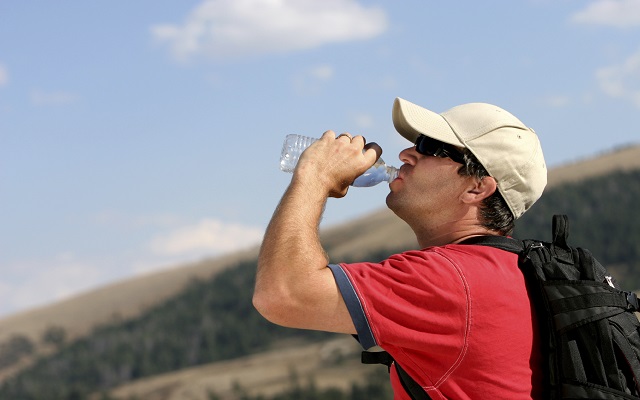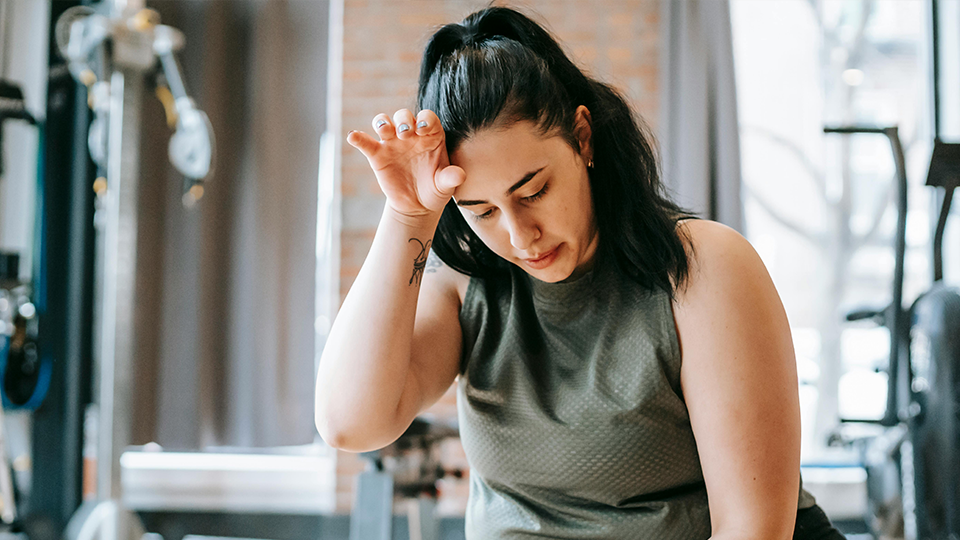Our bodies are made up of approximately 60 percent water. The fluids we put in our bodies play an essential role to our energy production, how we feel, and ultimately, our level of performance. Continuously replenishing our electrolytes throughout the day is the most important step for enhanced energy, performance, healthy blood plasma volume, proper thermoregulation, and injury and fatigue prevention (1). Generally speaking, healthy adults should drink a minimum of two liters of fluids per day, and athletes require additional fluids based on the percentage of water weight lost during workouts. A body that’s improperly hydrated, by as little as one percent, can result in an electrolyte imbalance causing undue stress to the cardiovascular system and impairing physiological function and performance outcomes (1). This can lead to dehydration, which, if not treated, can cause various health problems—or even death (2, 3).
Hydration and replenishment requirements will vary from person to person, depending on size, sex, activity level, climate, and health status and are often confusing to understand (1, 4). Determining the best sources of “fluid energy” is essential for everyday health and athletic performance.
So, lets take a look and examine the components of fluid energy.
Bursting The Water Bubble
Perhaps you’ve heard that unless you drink eight to ten glasses of water a day, on top of all the other beverages and foods you consume, your hydration and performance will be suboptimal. This notion has been scientifically proven untrue. Recent studies, including one published in the Journal of Food and Nutrition Sciences, scientifically confirm fluids other than water to provide superior hydration and rehydration that counts towards overall daily water intake. Fluids that contain carbohydrates and electrolytes supplement and replace energy burned and minerals depleted, such as sodium, potassium, and magnesium, key factors to enhanced performance and maximum bodily functioning (1, 5).
Water is essential for survival and a perfect thirst quencher, but water is not the perfect electrolyte replenisher. If an athlete is dehydrated and drinks only water to rehydrate, they can potentially turn off their mechanism of thirst before proper rehydration is accomplished (5-7).
Fluid Foods
We become hydrated through three sources: water, food, and metabolic water production (3). Foods provide varying degrees of water to the body, and yes, you can actually “eat your water” to be optimally hydrated. Vegetables and fruits such as lettuce, celery, tomato, cucumber, melon, and citrus all contain high percentages of water. Dairy products, including kefir, yogurt, and shakes, are also water dense vehicles acting to replenish and hydrate the body. Foods that contain high percentages of water, and that contain electrolytes and micro- and macro-nutrients, rank higher than plain water for rehydration, especially after exertion or extended durations in warm environments (5-8).
Welcome Whey
Whey protein shakes consistently prove to be an excellent alternative for optimal hydration. These shakes also efficiently rehydrate an individual due to their high ratio of natural electrolytes, carbohydrates, and proteins and because of their effects on prolonging satiety. Whey protein also provides a complete amino acid profile critical for muscle protein synthesis and for optimal lean body mass. Scientific reviews of whey protein have reported it to be one of the best sources of branched-chain amino acids, which enhances athletic performance, helps to regulate glucose metabolism, aids in weight loss, promotes greater muscle growth, and increases the retention of muscle tone (8).
What Else Counts?
The Journal of the American College of Nutrition published a study measuring the impact various fluids have on hydration. Healthy males received different beverages, including water and juice. This urine was tested for biomarkers of hydration and dehydration status. All of the men, regardless of the beverage consumed, were found to be adequately and equally hydrated. Regardless of what you drink, if water is a component, you are actively hydrating your body (9).
The Question of Coffee
Factually, coffee does not contribute to dehydration over the course of the day (10). Coffee is an appropriate fluid for hydration and for increasing exercise tolerance and enjoyment (11). Coffee has been found to enhance the likability of exercise which promotes longer sessions of exertion (11). It has also been linked to better metabolic functioning, which might lead to greater weight loss outcomes. Furthermore, coffee has been scientifically linked to improved mood and cognition, and the British Journal of Nutrition reported that hydration is indeed imperative for better mood, all of which make coffee a true win-win in terms of both its hydrating and mood-lifting benefits (11-13).
And, pivotal to this discussion, as quoted from a recent publication, “consumption of caffeine-containing beverages does not lead to fluid loss and is not associated with poor hydration status” (10).
Sipping Slim
Staying properly hydrated is important to lose and maintain weight. For weight loss, it is recommended to drink 16 ounces of non-sugary fluids before meals to increase satiety. The European Journal of Obesity published a study describing the beneficial effects of water intake on weight loss and weight maintenance and noted that the act of ingesting calorie-free fluids before meals prevented excessive eating. This study, and others, have concluded that a glass of water, a cup of coffee, or any other sugar-free beverage before enjoying meals and snacks is beneficial for achieving optimal weight loss goals (14-16). Also, a body that is properly thermo-regulated, via adequate hydration, burns more calories and water consumption is linked with better weight-loss outcomes (14- 16). Finally, coffee, which is rich in polyphenols and caffeine, can increase the body’s metabolism, and much evidence pointing to individuals who drink coffee and tea shows that they have a greater capacity to lose and maintain weight loss (12).
The Bottom Line
An easy rule of thumb to follow is to drink so that you never find yourself thirsty. By doing so, you are ensuring that your body will not have to play hydration catch-up after every activity. Consume plenty of fluids, fresh fruits, and vegetables throughout your day. Put your IsaLean® Shake, IsaPro®, AMPED™ Hydrate, Ionix® Supreme, BEA™, and e+™ to work. These products hydrate the body and replace depleted electrolytes in a capacity that also sustains energy and satiety. To boost your energy and electrolytes throughout the warm summer days, add AMPED Hydrate to water, green juice, IsaPro shakes, or fruit smoothies. AMPED Hydrate provides a blend of superfruits including coconut water powder, mango, banana, and ginger root with 100 percent of the U.S. RDA of Vitamin C and an assortment of B vitamins and zinc. Enjoy the process of mastering your fluid energy intake and always drink to your best health.
References
-
Von Duvillard S et al. Fluids and hydration in prolonged endurance performance. J Nutr 2004;20: 651-656.
-
The World Health Organization. Diarrhoeal disease fact sheet. 2013:330.
-
Nissensohn M et al. Assessment of beverage intake and hydration status. Nutr Hosp. 2015;31:62-69.
-
Lafontan M et al. Opportunities for intervention strategies for weight management: Global actions on fluid intake patterns. Obes Facts. 2015;8:54-76.
-
DeNyssche C et al. The Physiological effects of Gatorade versus diluted fruit juice during exercise: A preliminary study. J Food and Nutr 2014;1.
-
Murray B. Preventing dehydration: Sports drinks or water. Gatorade Sports Science Institute. (doi: 06.2015).
-
Maughan J et al. Fluid replacement in sport and exercise: A consensus statement. Br J Sports Med. 1993;27:34-35.
-
Pegoretti C et al. Milk an alternative beverage for hydration. Food Nutr Sci 2015;6:547-554.
-
Tucker M et al. Hydration status over the 24-H is not affected by ingested beverage composition. J Am Coll Nutr 2015; 19:1-10.
-
Lafontan M et al. Opportunities for intervention strategies for weight management: Global actions on fluid intake patterns. Obes Facts, 2015; 8:54-76.
-
Lucas M et al. Coffee, caffeine, and risk of depression among women. Arch Intern Med 2011; 26:1571-1578.
-
Rustenbeck I et al. Effect of chronic coffee consumption on weight gain and glycaemia in a mouse model of obesity and type 2 diabetes. Nutr Diabetes2014;4:6-30.
-
Masento N, Golightly M, Field DT, Butler LT, Van Reekum CM. Effects of hydration status on cognitive performance and mood. Brit J of Nutri. 2014. 111 (10) 1841-1852.
-
Lafontan M. Hydration for health. Euro J Obesity. 2014. 10. (1159).
-
Perrier ET, Armstrong LE, Daudon M et al. From state to process: Defining hydration. Euro J Obesity. 2014.
-
Borys JM, Ruyter JC, Finch H et al. Hydration and obesity prevention. Euro J Obesity. 2014.





